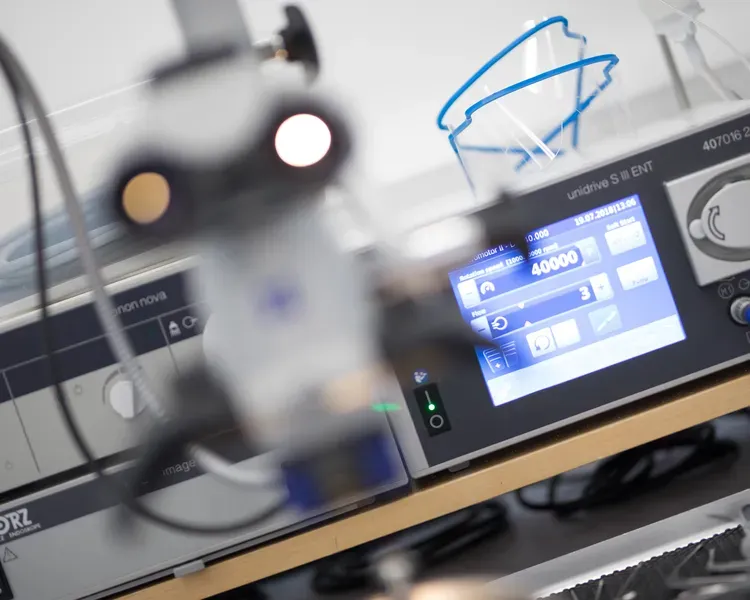Instrumentation and Clinical Engineering
The use of numerous items of equipment throughout the NHS, many of them highly complex, has lead to the establishment of Instrumentation & Clinical Engineering as a speciality within Medical Physics.

Instrumentation services
Our services are for repairs, maintenance, and a full programme of service checks on a wide range of hospital equipment ranging from thermometers to radiotherapy linear accelerators.
In addition to repair and service work, equipment may also be modified for special purposes or for increased safety. Sometimes new equipment must be designed and constructed for research or for new methods of treatment.
Diagnosis of disease by means of electrical body signals (electrophysiology) requires specialised skills and equipment. One of the duties of Instrumentation Physicists is to advise and assist doctors and technicians with such techniques and equipment. This occurs in such areas as audiology, EEG, ophthalmology and electrical pain relief.
Research students are supervised and experimental work may be carried out in the Medical Physics laboratories.
The Instrumentation unit is accredited to ISO9001.
Medical Physics Instrumentation has three distinct sections: Support, Technical and Research and Development
Support services
Support services are the administrative and IT backing for the technical services, maintaining databases, software, support contracts, procurement and goods despatch necessary for the functioning of the department. Particularly with contracts and equipment inventory these services are offered across NHS Tayside sites and departments.
Technical services
All new equipment is tested after purchase and is added to the comprehensive asset management database which is maintained by Support Services. Arrangements are also made for routine servicing of new equipment.
Equipment is evaluated to IEC 60601-1 requirement.
The Technical section offers the following services:
Electrical and electronic services
- Repair of general electro-medical equipment, specialised electro-medical equipment (e.g. surgical lasers) and laboratory equipment.
- Technical support is supplied for the busy drop-in sleep clinic and the patients' continuous positive air pressure (CPAP) systems are checked.
- All medical and laboratory equipment is given an annual Portable Appliance Test safety check by the section, but life support equipment is subject to more intensive scheduled routine maintenance. Infusion devices are checked for damage, safety and calibration. Cardiac arrest trolleys are functionally checked. (Other life support equipment is dealt with by Renal and Anaesthetic sections). Special calibration is provided for audiology and physiotherapy equipment.
Anaesthetics & Critical Care Services
- All gas supplies and suction, all devices connected to medical gases are supervised by the anaesthetic technicians.
- Routine maintenance and repair is performed on anaesthetic machines, ventilators, flowmeters, regulators, suction controllers, aerosol therapy and oxygen concentrators.
- Routine calibrations are carried out on vaporisers and anaesthetic gas pollution is monitored.
Mechanical Repairs
- Repair of mechanical, hydraulic, pneumatic, vacuum and optical devices along with dental handpieces and a comprehensive repair/routine servicing package for nebulizers for the whole Tayside area.
- Patient hoists are maintained throughout NHS Tayside and a calibration service is offered for all patient scales to comply with current weights and measures regulations.
- Repair and maintenance of local councils' independent living equipment is carried out on a contract basis.
Renal Services
- Repair, scheduled servicing and planned routine maintenance of all dialysis-related equipment for 52-bed stations plus home locations within the Tayside area with planned installations in Perth and Stracathro.
- Equipment supported includes all types of devices used in haemodialysis and peritoneal dialysis treatment modalities, a sophisticated water treatment plant, providing the dialysis unit with ultra-pure water, and a two-station reprocessing system used to facilitate the multiple uses of dialysers (artificial kidneys).
- Technicians provide the unit staff and patients with training on the correct and safe operation of equipment and the "on-call" arrangement means that staff and home-based patients can contact a technician immediately for expert advice in the event of doubt or equipment failure. Typically this section will deal with around two hundred requests per month covering the whole Tayside area.
Research and Development
The Research and Development section is staffed by highly qualified technologists and clinical engineers/physicists.
Accredited to ISO 13485 to design and manufacture medical equipment to the Medical Devices Directive and to CE mark it accordingly.
Research and Development section offers the following services:
Feasibility Studies
- Present viable solutions to a wide range of technical problems and provide estimates of costs for plans of action that will achieve the assigned objectives. Not all projects require new equipment.
Design
- Produce working drawings and specifications for components, instruments, machines, and processes. There may be the purchase of newly made equipment and/or manufacture of such.
Manufacture
- Electronic and mechanical workshops are equipped to produce items ranging from simple single-component items to complex mechatronic systems incorporating electronics, intricate mechanical assemblies and custom-written software.
Staff
person
person
person
person
person